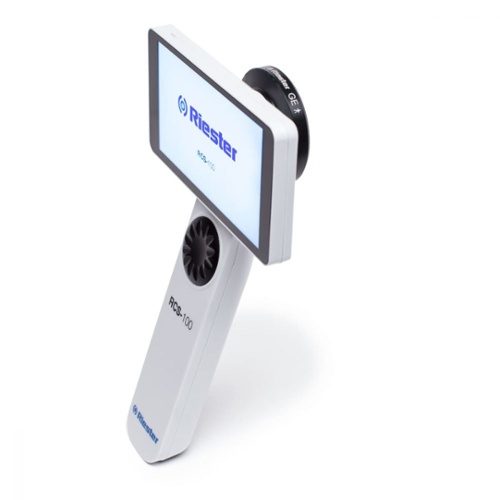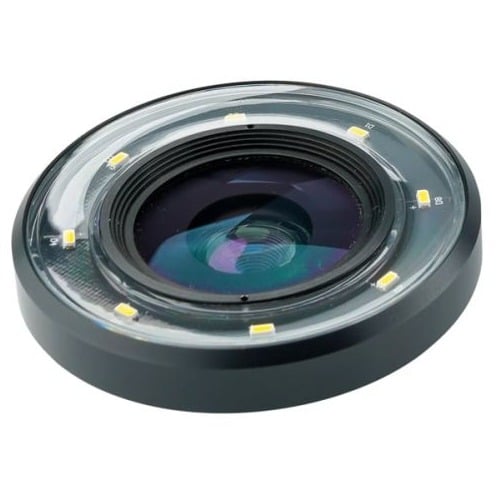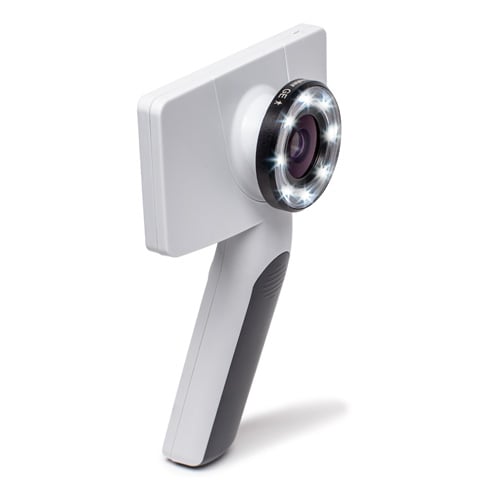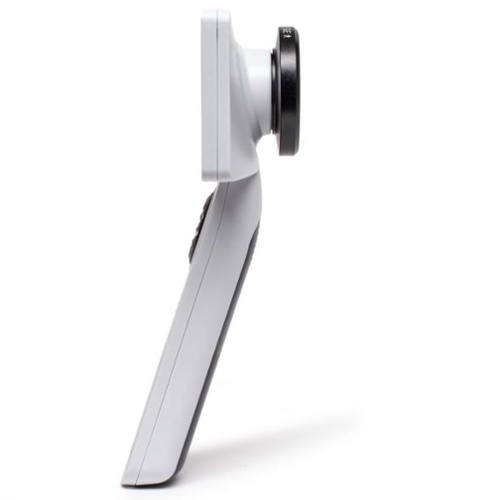RCS-100 Medical Camera System with General Lens
The RCS-100 with general lens can be utilised for a general initial screening, or more specifically for the assessment of the mouth and throat.
Features of the General Lens
The general lens provides a 78° field of view and 4x digital magnification for assessing conditions such as tooth decay, gum disease, abscesses, tonsilitis and more, whilst also providing the additional benefit of capturing and sharing of digital photographs or video to support with diagnosis, monitoring or treatment.
Providing evidence of diagnosis and improving effectiveness of treatments
Healthcare and insurance providers, in particular, are becoming increasingly focused on evidence; evidence of a diagnosis and to approve treatments. RCS-100 can support this demand by providing images and/or videos of a multitude of diagnoses, monitoring diagnoses and tracking the effectiveness of treatments.
Doctors from universities in Warwick, England, found that when presented alongside a diagnosis, medical images may aid patient understanding, recall and trust in medical information and they may be a powerful resource for patients that could be utilised by clinicians during consultations.1
Product details
| RCS-100 General Lens |
|---|
| Dimensions | 60.5 mm x 60.5 mm x 19.0 mm 23.82 in x 23.82 in x 0.75 in |
| Weight | 66.4 g (2.34 oz) |
| F/# (focal length/width) | 2.0 |
| Field angle | 78° |
| Depth of field scope | 30 mm - 4 m 1.18 - 157.48 in |
| Lighting source | Natural light LED |
| LED colour temperance | 5500 K |
| RCS-100 |
|---|
| Size | 225 mm x 135 mm x 45 mm |
| Weight | 292.0 g |
| Focus | Automatic / Manual |
| Image format | JPEG |
| Video format | MP4 |
| Adapt input | 100 - 240 VAC, 50/60 Hz, 0.3 A |
| Adapt outnput | 5 VDC, 2 A |
| USB | OTG and type-C USB |
| Extend memory (OPT) | 16 GB Wi-Fi SD car |
| RAM | 2 GB LPDDR3 |
| ROM | 16 GB |
| CMOS sensor resolution | Total number of pixels: 3296 (H) x 2512 (V) approx. 8.28 M pixels Number of effective pixels: 3296 (H) x 2480 (V) approx. 8.17 M pixels Number of active pixels: 3280 (H) x 2464 (V) approx. 8.08 M pixels |
| Battery |
3.6 V, 2600 mAh, Li-ion battery (type 18650) |
Ordering information
RCS-100
| ART. NO. | REGION | DESCRIPTION |
|---|---|---|
| 1970-H | All | RCS-100 basic model, no lenses |
| 1970-HXGX1 | All except US | RCS-100 basic model, general lens |
| 1970-HDGO | All | RCS-100 basic model, otoscope, dermatoscope and general lens |
| 1970-HDGX | All except US | RCS-100 basic model, dermatoscope and general lens |
| 1970-HXGO | All except US | RCS-100 basic model, otoscope and general lens |
1 USA: Art. 1970-H + 13271
Lenses and Adapters
| ART. NO. | REGION | DESCRIPTION |
|---|---|---|
| 13271 | All | General lens |
Accessories
| ART. NO. | REGION | DESCRIPTION |
|---|---|---|
| 13274 | All except US | Case for RCS-100, black |
| 10725 | All | Li-ion battery (type 18650) for RCS-100 |
Downloads
The RCS-100 Medical Camera System
Learn more about the RCS-100 with a choice of lenses and adapters that can be used to assess a patient's ears, throat, skin and more.
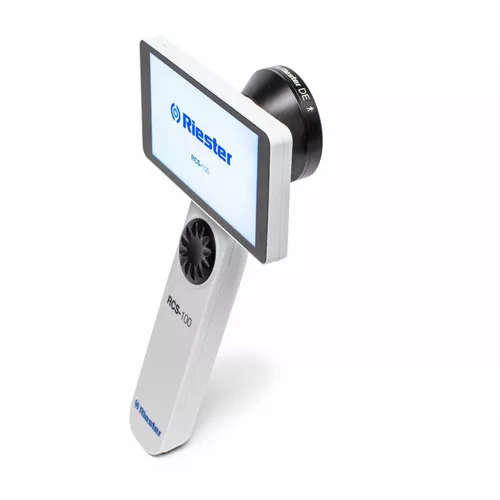
RCS-100 Digital Dermatoscope
RCS-100 Medical Camera System with a Special Lens for digital dermoscopy.
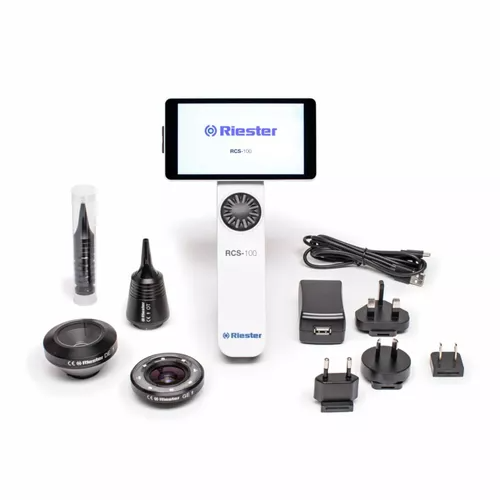
RCS-100 Medical Camera System
RCS-100 Medical Camera System is available with a choice of lenses and adapters.
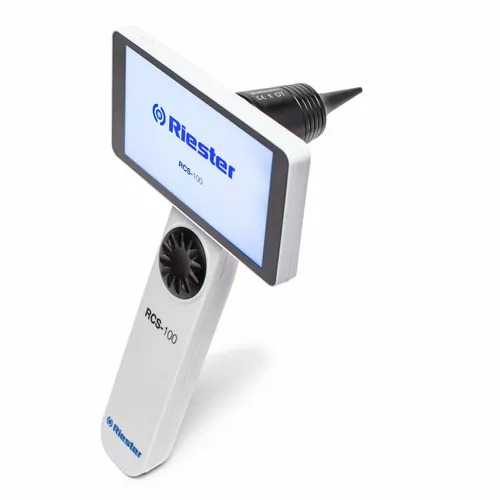
RCS-100 Digital Otoscope
RCS-100 Medical Camera System with Otoscope Lens for digital otoscopy.
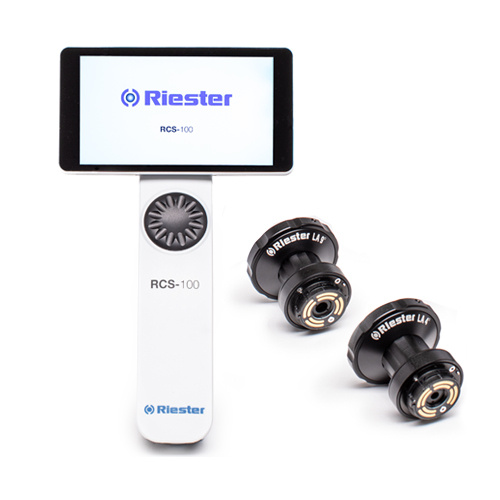
RCS-100 with Endoscope Adapters
RCS-100 Medical Camera System with two different Endoscope Adapters.
Where to buy?
Riester products are available in over 150 countries. Enter your country to easily find an authorized Riester distributor near you.

Phelps, E., et al. (2017). 3D medical images: A novel approach to understanding and visualizing medical data. Retrieved February 25, 2022, from https://warwick.ac.uk/fac/sci/psych/people/mkunar/mkunar/phelps_et_al_2017_-_3d_medical_images.pdf

